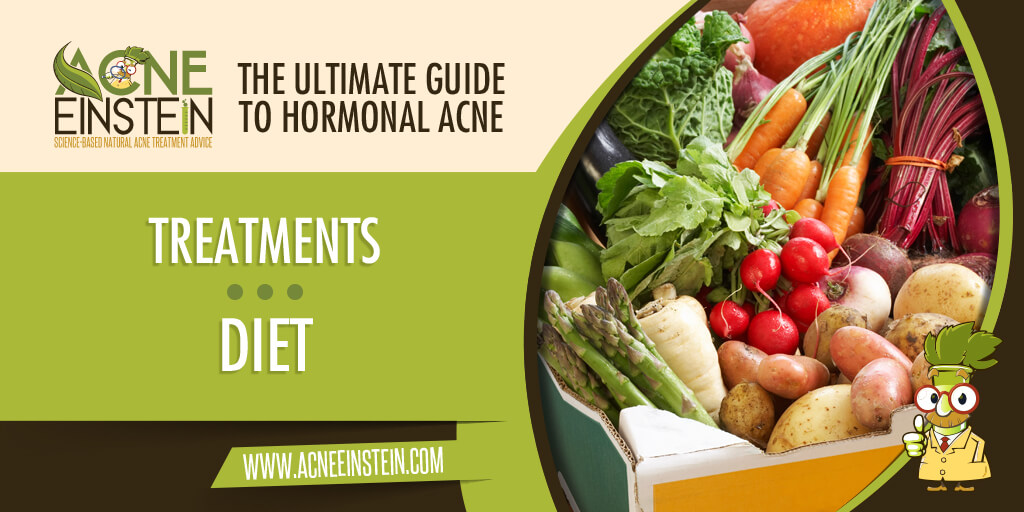The Ultimate Guide to Hormonal Acne
Treatment - Diet
Diet can balance hormones and reduce acne. Here we’ll review the most important dietary strategies for dealing with hormonal acne.

Perhaps the biggest disservice dermatologists have done for acne patients is to spread the myth that diet has no effect on acne. This denial has never been based on science. In fact, early 20th century dermatologists frequently asked patients to cut out sugar and dairy products. During 1960s two relatively poor studies were published that appeared to show diet has no effect on acne. There were serious flaws in these studies, but the notion that diet has no effect on acne was accepted and written in dermatology text books. Over time it turned into a dogma that’s only now beginning to break down.
Since 2002, every study that has looked into this has shown diet does affect acne. I covered this in detail in this post: Debunking The REAL Diet Acne Myth.
Two food groups are the most relevant for hormonal acne: sugar and carbohydrates, and dairy products.
Sugar and carbohydrates
Most studies on the effect of diet on acne have looked at sugar and carbohydrates. These studies show that you can reduce acne by reducing the glycemic index (GI) of your diet. Glycemic index of a particular food shows the effect a given foods has on blood sugar levels. Foods with high GI cause a rapid increase in blood sugar levels, whereas low to moderate GI foods increase blood sugar levels more slowly and steadily. Rapid increases in blood sugar levels cause the pancreas to pump out a lot of insulin, and we’ve already discussed how insulin is the cornerstone hormone in acne.
You can learn the GI values of different foods from the Glycemic Index website University of Sydney has created. However, a good rule of thumb is to avoid sugar and white (or processed) carbohydrates. As a general rule, whole grains and carbohydrates that are less processed have low GI and thus are less likely to cause acne. Eating more fat and protein and less carbohydrates overall also helps.
Studies show that switching to low GI diet can reduce acne between 25 and 50%
Studies show that switching to low GI diet can reduce acne between 25 and 50%. Studies have also reported lower sebum production in people on low GI diet. And the studies that measured hormone levels show that low GI diets:
- Reduce levels of testosterone and other androgens.
- Reduce insulin and IGF-1 levels.
- Increase the levels of sex hormone binding globulin (binds and deactivates testosterone in blood).
- Increase in estrogen levels.
Given the hormone-balancing effect of low GI diets, I would expect them to also reduce PMS symptoms and premenstrual acne.
Study calls dairy products “nature’s perfect food for the creation of acne”
Dairy
Dairy products are perhaps the biggest dietary cause of hormonal acne. In fact, in a 2011 review on the role of diet in acne, Dr. Danby called dairy products as ‘nature’s perfect food for the creation of acne’. According to the review, dairy products:
- Increase the levels of insulin and IGF-1 in the blood
- Boost the production of androgens in the ovaries, testes, and adrenal glands
- Increase the sensitivity of the skin to androgen hormones
This is why studies show those who regularly consume dairy products are 20 to 80% more likely to have acne than those who don’t consume dairy products. Anecdotally, forums and blogs dedicated to natural acne cures are full of stories from women who say their acne got much better after dropping dairy products.
Other foods that cause acne
On this post I focused on foods that are linked to hormonal acne. But that’s not the be-all-end-all of diet and acne. Hormonal acne is just one of many ‘acne types’. Other acne types, such as gut acne or inflammatory-type acne, require different diets. In Clear for Life, I go over diet and treatment plans specific to each acne type.
Previous
Medications

